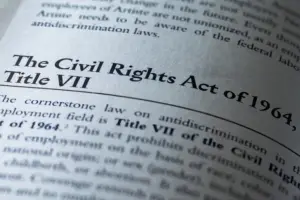Gender discrimination at work is not always loud. Sometimes it shows up as a manager who stops giving you opportunities after you transition, a pay gap that never gets explained, “culture fit” comments that only seem to apply to women, or discipline that hits you harder than coworkers doing the same job.
If your job, pay, schedule, promotion path, or day to day treatment changed because of your sex, gender, gender identity, gender expression, pregnancy, or sex stereotypes, you may have a legal claim under California law.
West Coast Employment Lawyers helps workers in Los Angeles hold employers accountable for gender discrimination, gender based harassment, and retaliation. We will listen, explain your options, and move quickly to protect evidence, deadlines, and your income.
Taking early action can make all the difference. Book a FREE consultation today by calling 213-927-3700 or filling out our quick online contact form.
Why Choose West Coast Employment Lawyers
When you are dealing with gender discrimination at work, you need more than generic advice. You need a team that knows how employers defend these cases, how to build leverage fast, and how to prepare every claim like it may end up in court.
West Coast Employment Lawyers is built for that. We combine high level legal training, real courtroom experience, and a client first approach that keeps you informed and supported from day one.
Best in Class Legal Firepower
- Harvard Law School level training in our leadership and legal team background
- Led by a former federal prosecutor with serious litigation experience
- Proven record against major corporations, not just small disputes
- $1.7 billion won and counting across our broader trial results platform and affiliated experience
Client First, Full Service Support
- Speak to a lawyer on your first call, not a call screener
- Direct access to your attorney, so you are not left guessing
- Our own in house trial team, ready to litigate when the other side refuses to be reasonable
Trusted and Respected
- Chosen by major news organizations for legal insight, including Fox News, CNN, and the BBC
- We’re devoted to your needs and won’t rest until we’ve done everything we can to protect your rights.
- Our team examines your case from every angle to make sure your rights and recovery are fully protected.
If you want a Los Angeles gender discrimination team that moves with urgency, prepares cases with real leverage, and treats you with respect throughout the process, West Coast Employment Lawyers is ready to help.
What Gender Discrimination Looks Like in Workplaces
Gender discrimination is unfair treatment at work based on sex or gender related characteristics. It can happen during hiring, training, scheduling, pay decisions, performance reviews, promotions, discipline, medical leave, layoffs, and termination.
It can also be based on how someone “should” act, dress, speak, or present. California law recognizes that discrimination can be rooted in stereotypes and bias, including bias against transgender and gender nonconforming employees.
Common Examples
- Pay inequity: You are paid less than coworkers of another sex for substantially similar work. California’s Equal Pay Act covers “substantially similar work” and is a powerful tool in gender pay cases.
- Promotion and leadership blocks: You are passed over despite strong performance, while less qualified coworkers advance.
- Pregnancy discrimination: Your hours are cut, you are pushed out, disciplined, or terminated because you are pregnant or recently gave birth.
- Hostile work environment: Sexual comments, slurs, “jokes,” misgendering, or invasive questions are tolerated or ignored.
- Discipline double standards: You are written up for behavior that others are allowed to do.
- Bathroom and dress code issues: Policies are enforced in ways that target gender identity or gender expression.
Laws That Protect You From Gender Discrimination in California
In California, workers often have protections under state and federal law. Which claims apply depends on the employer size, the facts, and the best strategy for your case.
For instance, California’s main employment discrimination law requires most employees to start by filing with the California Civil Rights Department (CRD), which can issue a Right to Sue notice so you can go to court. In general, CRD complaints for employment discrimination must be filed within three years of the discriminatory act.
However, if your claim involves unequal pay, California’s Equal Pay Act prohibits paying employees less for substantially similar work based on sex (and also covers race and ethnicity). In more severe cases, Federal law (Title VII) can also apply, but if you pursue a federal route, deadlines can be as short as 180 days.
What You Need to Prove in a Gender Discrimination Case
You do not need a “smoking gun” email that admits discrimination. Many cases are proven through patterns, inconsistencies, and comparative treatment. Helpful evidence can include:
- Pay records, schedules, performance reviews, write ups
- Emails, Slack messages, texts, meeting notes
- Witnesses who saw unequal treatment or comments
- Comparators: coworkers treated better in similar situations
- Timeline evidence: what changed after you complained, disclosed pregnancy, transitioned, or rejected harassment
If you are worried about keeping your job, we can discuss strategies that protect you while the case develops, including documenting issues safely and avoiding common traps.
What Compensation Can Include
Every case is different, but gender discrimination claims can involve:
- Back pay and lost benefits
- Future pay loss
- Emotional distress damages
- Penalties in some wage related claims
- Attorney’s fees and costs in many cases
- Policy changes or reinstatement in appropriate cases
The value of a case depends on the evidence, the harm, and how the employer responds once they realize the claim is being handled seriously.
Why Working With a Gender Discrimination Lawyer Matters
Employers and their insurers often deny discrimination while building a paper trail against you. A lawyer helps you control the narrative with evidence, deadlines, and strategy. West Coast Employment Lawyers can help by:
- Assessing your claims under California and federal law
- Building the timeline and evidence file
- Communicating with the employer, HR, or counsel so you are not navigating it alone
- Filing with CRD and securing the Right to Sue process when appropriate
- Negotiating a resolution, or filing suit when litigation is the right move
Deadlines That Can Make or Break Your Case
If you remember one thing, make it this: waiting can damage your case even when the deadline feels far away. Evidence disappears, witnesses leave, and employers keep writing their version of events.
- CRD filing is generally required for FEHA employment cases and is generally due within three years.
- EEOC deadlines can be as short as 180 days, often 300 days in California.
If you are not sure which deadlines apply, talk to a lawyer quickly. A short consultation can prevent a long term loss of rights.
Talk to a Gender Discrimination Lawyer Today
If you were treated differently at work because of your sex, gender, gender identity, gender expression, pregnancy, or gender stereotypes, you deserve real answers and a plan. West Coast Employment Lawyers offers confidential consultations for Los Angeles gender discrimination claims. Call now or message us to get started.
To schedule a FREE consultation, you can reach out to us by calling 213-927-3700 or completing our easy online contact form.
Frequently Asked Questions About Gender Discrimination Claims
Is Gender Discrimination Illegal Even if My Employer Never Said Anything Directly About My Gender?
In many cases, gender discrimination is still unlawful even if no words are said. If there is a pattern of actions and unequal treatment rather than direct admissions, it can still violate antidiscrimination laws.
Does California Protect Gender Identity and Gender Expression at Work?
California’s FEHA framework and related regulations include protections that cover gender identity and gender expression in employment contexts.
My Employer Says I Was Fired Due to “Performance.” How Do You Challenge That?
We look at timing, consistency, how others were treated, whether expectations changed suddenly, and whether the employer’s explanation matches the records.
Do I Have to File With a State Agency First?
In most California employment discrimination cases, you generally must go through CRD to obtain a Right to Sue notice before filing in court.
What if I Am Still Employed and Afraid of Retaliation?
This is a very common concern, but workers should not be afraid of retaliation. While strategy and timeliness does matter, our attorneys can discuss how to document issues safely and how to reduce risk while protecting your claim.
Can I Get Fired for Reporting Gender Discrimination At Work?
No, if an employee was rejected for employment, fired, or harmed in the course of their employment because of their gender or perceived gender, it’s likely that they have suffered gender discrimination in the workplace.






























